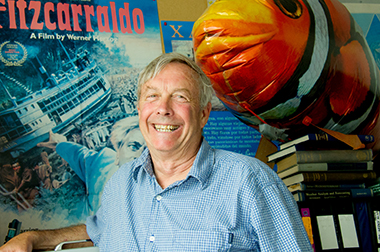UAlbany Fulbright Researcher, Brazilian University Collaborate to Analyze Deforestation in the Amazon Rain Forest
 |
|
ASRC Research Associate David R. Fitzjarrald's work in smaller scale meteorology is important in understanding the impact of regional climate change. (Photo by Mark Schmidt)
|
ALBANY, N.Y. (August 5, 2013) – David R. Fitzjarrald, a Fulbright Distinguished Chair in Environmental Sciences at the University at Albany Atmospheric Sciences Research Center (ASRC), will collaborate with investigators at the University of Western Pará (UFOPa), Santarém, Brazil, to analyze on-the-ground measurements of the Amazon rain forest to determine how the climate is being affected by deforestation. Fitzjarrald will conduct the first phase of his research in August and September supported by a Fulbright Fellowship, a program designed to build mutual understanding between the people of the United States and other countries. While in Brazil, Fitzjarrald will also work with and mentor UFOPa students.
“The Fulbright award affords me an opportunity to continue my work in smaller scale meteorology, of critical importance in understanding the impact of regional climate change,” Fitzjarrald said.
According to Fitzjarrald, the population in the Amazon Basin has exploded in recent decades with forests being replaced by pasture, rice and soybean fields. Fitzjarrald will help the newly established university expand its ability to analyze how landscape variations -- forest, crop and river -- combine to determine the Amazonian rainfall and other climate properties.
With his colleagues at UFOPa and at other Amazon universities, he’ll seek to make climate records from the early 20th century more widely available and re-examine data retrieved from the '98-'06 LBA-ECO project he and Brazilian colleagues conducted in the region. During that project, meteorological techniques were used to measure the net amount of carbon exchange to forest and determine how environmental influences and land use modulate the process.
Fitzjarrald will also tap into the relationships he has built over 30 years with scientists in Brazil, many of whom he trained. In 1983, Fitzjarrald met the scientists who are now the leaders of atmospheric sciences in Brazil. His ASRC 1990 postdoctoral visitor now heads the Brazilian Numerical Weather Prediction Center.
Professor Rodrigo da Silva, the founding chair of the new atmospheric sciences department at UFOPa, will be his lead collaborator in Santarém. Da Silva developed an instrument to measure CO2 concentrations on a tethered balloon flying above the pasture and forest during his two six-month visits to Fitzjarrald’s lab, the last one in 2003.
As part of the course Fitzjarrald will teach in Portuguese at UFOPa on boundary layer meteorology, he plans to introduce inexpensive Raspberry Pi Linux computers – smaller than one’s hand and costing about $35 – to make recording environmental data affordable.
“This method gives that university center less expensive ways to acquire data,” said Fitzjarrald. “In addition to Brazil, I have partners in Mexico – two places with limited resources.” He has also conducted research in Antarctica, the Canadian sub-Arctic, and in Alaska.
In addition to measuring carbon exchange, Fitzjarrald will be correcting biases in rainfall measurements. These biases occur because the roads, and therefore, all the climate stations, in northern Brazil are near rivers.
During Fitzjarrald’s last trip to Brazil in 2011, free meteorology balloons whose altitude can be controlled were launched in eastern Pará state Brazil. To the scientists’ surprise, a fisherwoman ‘caught’ the balloon in the Tocantins River, and responded to the tag, which requested the finder return it. In a separate project, he is seeking funding for 14 more of these handmade weather balloons to be launched near Santarém or Manaus in 2014.
After Fitzjarrald returns from Santarém in September, he is scheduled to make the second leg of his research trip in June and July of 2014.
![]() For more news, subscribe to UAlbany's RSS headline feeds
For more news, subscribe to UAlbany's RSS headline feeds
A comprehensive public research university, the University at Albany-SUNY offers more than 120 undergraduate majors and minors and 125 master's, doctoral and graduate certificate programs. UAlbany is a leader among all New York State colleges and universities in such diverse fields as atmospheric and environmental sciences, business, education, public health,health sciences, criminal justice, emergency preparedness, engineering and applied sciences, informatics, public administration, social welfare and sociology, taught by an extensive roster of faculty experts. It also offers expanded academic and research opportunities for students through an affiliation with Albany Law School. With a curriculum enhanced by 600 study-abroad opportunities, UAlbany launches great careers.


